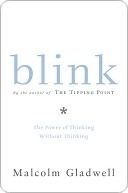More on this book
Community
Kindle Notes & Highlights
decisions made very quickly can be every bit as good as decisions made cautiously and deliberately.
Lobna and 1 other person liked this
what often happened with the couples who ended up in divorce is that when one partner would ask for credit, the other spouse wouldn’t give it.
We need to respect the fact that it is possible to know without knowing why we know and accept that — sometimes — we’re better off that way.
We have, as human beings, a storytelling problem. We’re a bit too quick to come up with explanations for things we don’t really have an explanation for.
The way he looked carried so many powerful connotations that it stopped the normal process of thinking dead in its tracks.
But there’s plenty of evidence to suggest that height — particularly in men — does trigger a certain set of very positive unconscious associations.
being short is probably as much of a handicap to corporate success as being a woman or an African American.
Hala Gamal liked this
Have you ever wondered why so many mediocre people find their way into positions of authority in companies and organizations? It’s because when it comes to even the most important positions, our selection decisions are a good deal less rational than we think. We see a tall person and we swoon.
Hala Gamal liked this
How good people’s decisions are under the fastmoving, high-stress conditions of rapid cognition is a function of training and rules and rehearsal.
allowing people to operate without having to explain themselves constantly turns out to be like the rule of agreement in improv. It enables rapid cognition.
extra information is more than useless. It’s harmful. It confuses the issues.
truly successful decision making relies on a balance between deliberate and instinctive thinking.
in good decision making, frugality matters.
Snap judgments can be made in a snap because they are frugal, and if we want to protect our snap judgments, we have to take steps to protect that frugality.
If you get too caught up in the production of information, you drown in the data.”
At 175, we begin to see an absolute breakdown of cognitive processing …. The forebrain shuts down, and the mid-brain — the part of your brain that is the same as your dog’s (all mammals have that part of the brain) — reaches up and hijacks the forebrain. Have you ever tried to have a discussion with an angry or frightened human being? You can’t do it …. You might as well try to argue with your dog.” Vision becomes even more restricted. Behavior becomes inappropriately aggressive.
Because when police officers are by themselves, they slow things down, and when they are with someone else, they speed things up.


